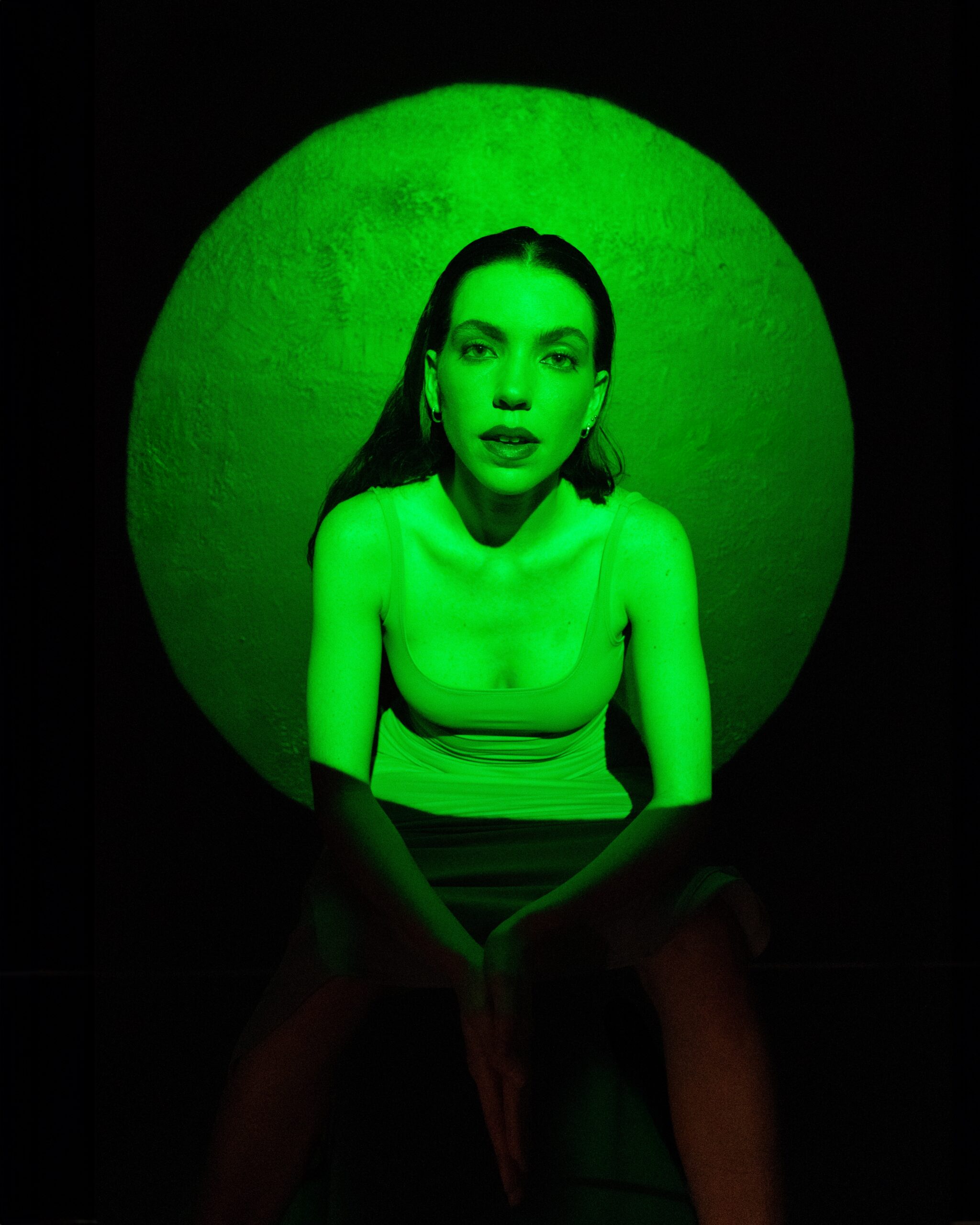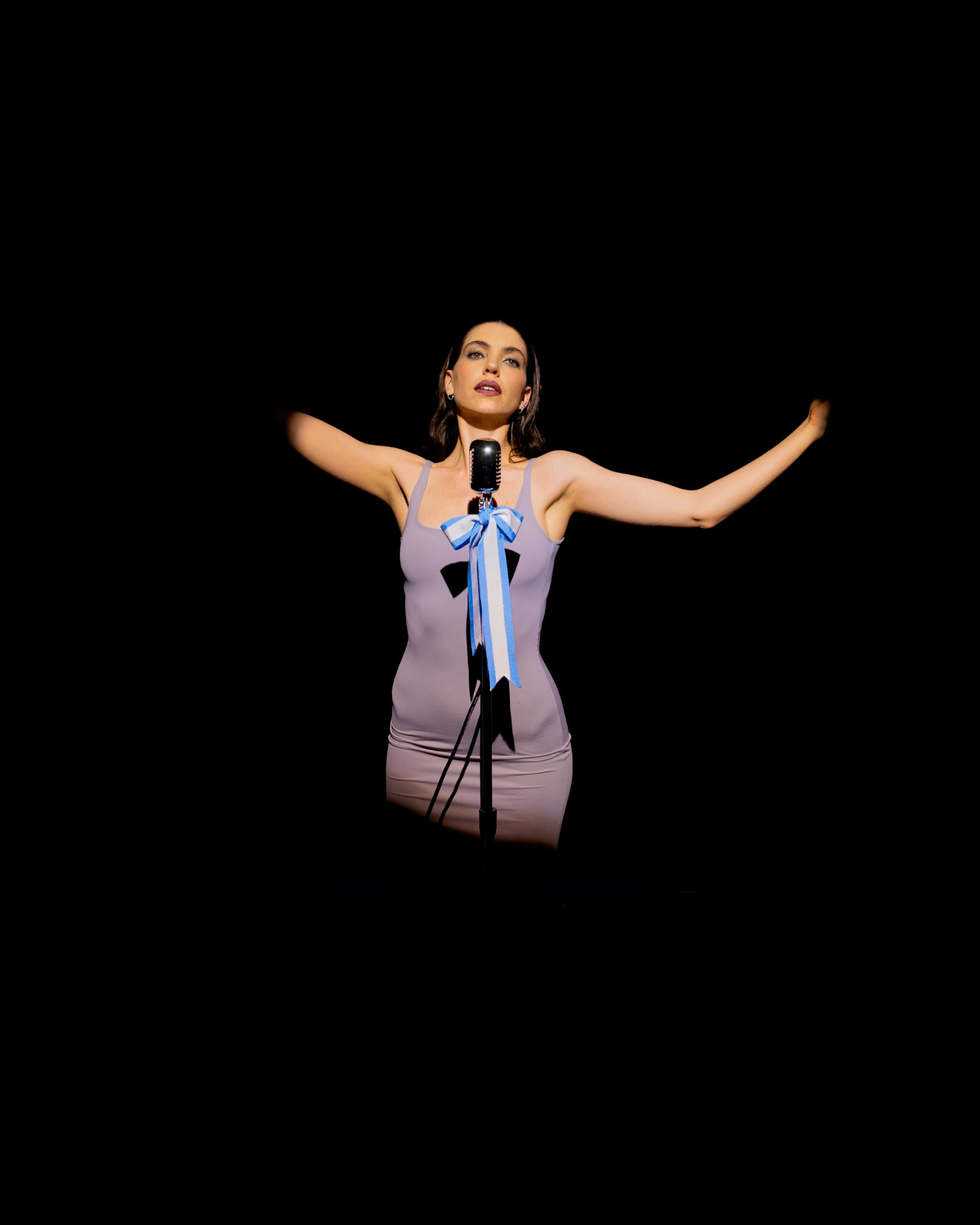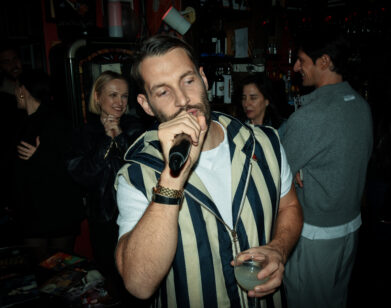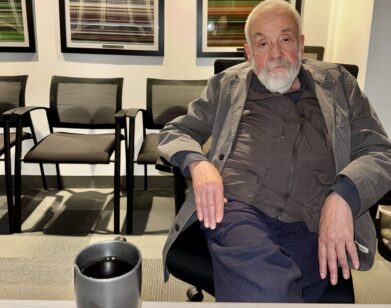BACKSTAGE
How Maia Novi Turned Her Mental Breakdown Into the Season’s Buzziest Play
If you live in New York—or on the Internet’s New York—you might have seen the words Invasive Species around town, on red balloons tied to park benches or embroidered on the baseball caps of Jennifer Lawrence, Paul Mescal, or a certain OnlyFans star. That’s all part of the Jeremy O. Harris publicity machine, which is currently churning in support of a new play he’s executive producing, written by and starring newcomer Maia Novi.
Luckily, the play is actually good, as frantic and hallucinatory as it was when it premiered at the microscopic Tank last summer before its current run at the Vineyard Theater downtown. If it weren’t for the stellar four-person ensemble beside her, it’d be tempting to call it Novi’s one-woman show. Nevertheless, it is her story; a funhouse ride from her native Argentina, where the first American film she ever saw was the Andrew Garfield Spider-Man in 2012, to a psych ward in New Haven, where she was admitted after a farcical attempt to acquire sleeping pills.
Like many of us, Novi struggles with matters of ambition and self-image. Unlike us, however, she had the Yale drama program urging her to drop her accent and adopt Gwyneth Paltrow’s diction. Eager to succeed, she (and her character) hyper-fixates on the Hollywood star as her mental health plummets, landing her in a surreal limbo from which she must act for her life. The show also cleverly parallels the audition process, in this case for a wildly insensitive Evita biopic. Directed by Michael Breslin with an eye toward pop maximalism—every contemporary dramatic work requires, at minimum, three Yalies—Invasive Species reimagines the Acting Bug as a bizarrely sexy demon with a spit kink. In the spirit of breaking down the barriers separating the public from the private, Novi and I met onstage at the Vineyard, where we discussed the voices in our heads, Goop, and why Argentinians are the Leos of Latin America.
———
JUAN RAMÍREZ: How are you feeling?
MAIA NOVI: I’m feeling… How am I feeling? I don’t even know how I’m feeling. I’m high on adrenaline. I feel like I’ve been driving a rollercoaster at 300 kilometers-per-hour and I could crash at any time. And something about that keeps me alive.
RAMÍREZ: I feel like you’d like that. The show’s kind of like that.
NOVI: I do like that. It doesn’t give me time to think ’cause when I think, I just fuck things up.
RAMÍREZ: Right. Did you have an idea this [transfer] was happening back at The Tank?
NOVI: No. I mean, literally, I was sticking flyers around the city by hand, fundraising donations to make it happen in the most off-off-off-Broadway theater. I didn’t know if people would laugh, ’cause my sense of humor is so Argentinian and freaky. I was like, “Will people get it?” It wasn’t really until people laughed consecutively at maybe three shows that I was like, “Maybe this can live for longer.”
RAMÍREZ: What’s the Argentinian sense of humor?
NOVI: The Argentinian sense of humor, it’s on the verge of passionate and maybe a bit too dangerous. It’s kind of provocative. It’s kind of ugly. I think Argentinians, maybe ’cause of soccer, have such an insane fanaticism and passion, which actually makes people not really like Argentinians sometimes, ’cause they can be a little entitled. But at the same time, it feels like they’re driving the train, in a way.
RAMÍREZ: Interesting.
NOVI: Argentinians, they’re always protagonists, which is also very me.
RAMÍREZ: You’re the protagonist?
NOVI: I’m a Leo and I’m writing a play about myself. So in that sense, yeah, my Argentinian-ness matches my Leo-ness.
RAMÍREZ: So, the story is that you wrote this as a response to Yale’s mental health thing?
NOVI: Yes.
RAMÍREZ: How was it driving your Argentinian train into Yale?
NOVI: I mean, I drove it right into a psych ward. That’s literally how it felt. It’s interesting, ’cause the first iteration of the play, I was sort of lying about how I got into the psych ward and trying to only blame the system. This is the thing about Argentinians: they do a lot with a little, they’re used to improvising. Theater in Argentina is very underground and very experimental. It has an unapologetic, grotesque, bizarro energy, which is maybe what led me into the psych ward, ’cause I stormed into that ER and was like, “Give me a sleeping pill.” In Argentina, if you want a sleeping pill, they just give it to you.
RAMÍREZ: Civilized.
NOVI: Civilized. I came in speaking Spanish and they didn’t understand what I was saying. I was using actor slang. They were like, “So, you haven’t been sleeping? How would you describe it?” And I was like, “My inner monologue.” They were like, “Your inner monologue? Are you hearing voices?” But then in this—did you get to see the show?
RAMÍREZ: Yeah, of course. I saw it at The Tank, too.
NOVI: Okay, great. In this one I get, at the end, a chance to be like, “Well, maybe I should be here.”
RAMÍREZ: It’s like describing what you’re feeling on an acid trip and trying not to sound insane.
NOVI: Yes. The play is acid.
RAMÍREZ: Sure.
NOVI: People have been like, “It feels like being on TikTok” or “It feels like an acid trip.” It’s kind of psychedelic. It moves like thunder.
RAMÍREZ: You throw yourself around and get thrown around a lot.
NOVI: Yes, I get thrown around a lot. I wanted to feel like I get thrown off a cliff at the beginning of the play and I land in the ocean, ’cause that final speech feels like that to me. I wanted to be dragged, spat on. And this is the thing, my favorite female characters in movies are broken. They’re not heroes. They are in their brokenness.
RAMÍREZ: Wait, how was Spider-Man in 2012 the first American movie you saw?
NOVI: A lot of the movies that come out here get to Argentina so late. Second of all, I wasn’t allowed to go to the movie theater when I was very young. When Starbucks came to Argentina, that was a huge deal. People were waiting in lines, there were reporters around. And it was kind of around the same time when I watched Spider-Man. Drinking that Frappuccino and seeing coffee take a shape and color that I never knew was possible, and then seeing Spider-Man in that same era of my life, it felt like this ultra-colorful HD wave of [gestures excitedly].
RAMÍREZ: That’s so interesting ’cause I feel like Emma Stone, and Jennifer Lawrence around that same time, were the last big movie stars we’ve had.
NOVI: Yes. ‘Cause celebrity culture is so different now with social media, obviously. The enigma of it all has been lost, the paparazzi culture. Being so far away from the US makes you also look up at these people like statues.
RAMÍREZ: There’s a line in the show: “Actors are big. We have big personalities.”
NOVI: Big personalities, but also deep insecurities. I mean, every actor I know is extremely insecure in their bigness. The majority are actually both very bold and insecure at once. The girlies that I think were really doing it are like, Gena Rowlands or Liv Ullmann. They were a level of celebrity that was under an umbrella of mystery. It might have to do with how movies are shot. The way film and colors were in movies before just makes celebrities feel like paintings. Whereas, now, they feel like a giant moving meme. Everything feels so HD.
RAMÍREZ: You see too much.
NOVI: You see too much. I want to see less. It’s funny ’cause in this play you see a lot, but also you don’t.
RAMÍREZ: Yeah.
NOVI: Right? What do you think?
RAMÍREZ: I don’t want to say you give the illusion of seeing a lot, ’cause that risks saying that what you’re putting out here is fake, but I can see this protective wall of theatricality. I want to ask about Gwyneth Paltrow, who hovers over this thing.
NOVI: This is true. She was the example that the teachers told me to imitate until I sounded like her, which obviously never happened ‘cause it’s really hard to sound like Gwyneth Paltrow. They were like, “She has a spread smile, you don’t.”
RAMÍREZ: What does that mean?.
NOVI: “It’s going to be really helpful for you to spread your smile more.” They were like, “She’s traveled a lot. She’s upper class, mature, confident. You need more of Gwyneth in you.” Not only vocally, but energetically. So I became obsessed with Gwyneth Paltrow until I literally couldn’t sleep. She’s soaked into my subconscious.
RAMÍREZ: She hasn’t acted in a while.
NOVI: That’s true. Goop was the new era. I sort of get to it in the play, but when I first went to Yale, they were like, “Oh my gosh, we’ve never had an Argentinian in the acting school.” And then they were like, “Well, you don’t look conventionally Latina,” whatever that means. You don’t look like Salma Hayek or whatever. Or the bizarre archetype that Americans might have of Latinos. But you also don’t sound American. You sound like a mashup of sounds that are hard to place and therefore are unmarketable.
RAMÍREZ: Were you surprised that a place like Yale had that mentality?
NOVI: Well, I wanted to go to Yale and not to acting school in London ’cause I thought,, “Yale has the universal stamp.” And intellectually, these bitches read. It’s this pedestal of knowledge. But then I got there and they were like, “Oh, they think Latin America is all one chorizo of information. Mexico, Venezuela, Argentina, it’s all the same thing.” The ignorance was the biggest surprise.
RAMÍREZ: I did my masters at Columbia and they were like, “You’re the fifth Latino we’ve ever had in the film program.”
NOVI: Of course.
RAMÍREZ: Then came the questions like, “Is your thesis going to be about Latin culture?” or whatever. And at first I like, “Fuck, no.” Lo and behold, it was about Venezuelan film.
NOVI: Right.
RAMÍREZ: How do you feel about that kind of tokenism?
NOVI: Specifically with this play?
RAMÍREZ: Yeah.
NOVI: I think this play is a huge question mark. I mean, Invasive Species is a universe, it’s not just a play. And you saw the marketing, it’s all very strange and chic and weird. As much as I don’t want to encapsulate Maia in the reality of some of the real events that she lived, ’cause it might not all be true, I do think that I wanted to create a machine that felt grotesque and bizarre and also funny and weird enough that you can’t really place it anywhere. It feels like I’m inside of a spaceship that is made out of Tetris blocks of different references. It feels very poppy, but it also feels very German, but it also feels very Latin American. And the humor feels very Latin American. So as much as it feels very specific to Maia, I think it’s really unplaceable.
RAMÍREZ: Tell me about working with Michael [Breslin]. He directed the shit out of this. How much of the script was done before you two started working together?
NOVI: The first script he read was for [a reading at] La MaMa, when the play functioned like a dramatic essay. I left the psych ward with a stack of papers of everything I heard and saw, ‘cause I couldn’t do anything else but write or read.
RAMÍREZ: Had you been a journaler before then?
NOVI: No. I had never journaled in my life. In the psych ward, you can’t really talk that much ’cause the nurses are listening all the time. So I was like, “I’m just going to write it down.” And then the games came up. I introduced all of these games to the teens and they introduced their games to me. The Suicide Squad, which was a trio of these three kids, presented me with this statement: “If you want to get out of here, you have to pretend to be normal.” So I wrote an essay, which is what Michael read, trying to answer that question. It was like, 10 different chapters of an essay, with different angles and points of view getting at that question. So Michael saw a dramatic essay, a gigantic block of marble, and he sculpted the shit out of it and then added a bucket of saturation. My brain is very animated and he made it less solemn and more funny and sexy, very sexy.
RAMÍREZ: It’s a sexy play. It’s a sexy universe that y’all are creating here.
NOVI: It’s hot and it’s spitting on me.










